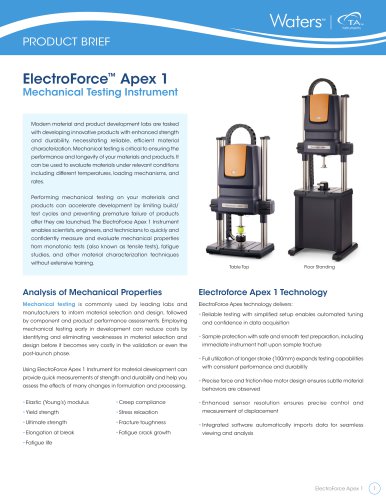 Website:
TA Instruments
Website:
TA Instruments
Group: Waters Corporation
Catalog excerpts
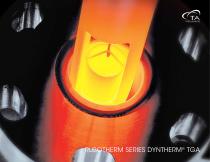
THERM SERIES DYNTHERM® TGA
Open the catalog to page 1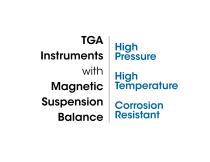
High Pressure High Temperature Corrosion Resistant
Open the catalog to page 2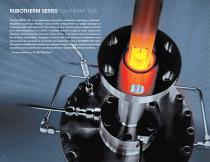
RUBOTHERM SERIES DynTHERM® TGA The DynTHERM TGA is an advanced gravimetric instrument featuring a patented* Magnetic Suspension Balance that enables measurement of weight changes of materials under high pressure, in the presence of a variety of gases, vapors, or steam, from room temperature to 1550°C. A flexible selection of gas & vapor dosing and blending devices provide accurate control of the composition and the pressure of the reaction atmosphere. Designed and built with over 20 years of experience and field proven by hundreds of customers, the Rubotherm Series DynTHERM TGA offers the...
Open the catalog to page 3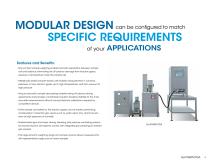
MODULAR DESIGN can be configured to match SPECIFIC REQUIREMENTS of your Features and Benefits: • Non-contact sample weighing enables hermetic separation between sample cell and balance, eliminating risk of balance damage from reaction gases, pressure or temperature inside the sample cell • Metallically sealed sample reactor cell enables measurements in corrosive, explosive, or toxic reaction gases, up to high temperatures, and from vacuum to high pressure • Unique automatic sample decoupling enables taring of balance during experiments and provides unmatched long-term baseline stability for...
Open the catalog to page 4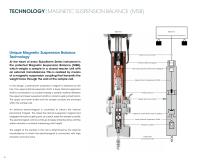
Unique Magnetic Suspension Balance Technology At the heart of every Rubotherm Series instrument is the patented Magnetic Suspension Balance (MSB), which weighs a sample in a closed reactor cell with an external microbalance. This is realized by means of a magnetic suspension coupling that transmits the weight force through the wall of the sample cell. In this design, a permanent suspension magnet is attached at the top of an upper internal suspension shaft. A lower internal suspension shaft is connected to a crucible holding a sample material. Between the upper and lower suspension shafts...
Open the catalog to page 5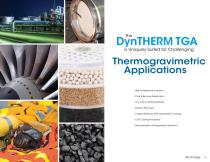
The DynTHERM TGA is Uniquely Suited for Challenging Thermogravimetric Applications • High Temperature Corrosion • Coal & Biomass Gasification • CO2 and H2 Getter Materials • Pyrolysis Processes • Catalyst Materials (TPx Sulphidation, Coking) • CVD Coating Processess • Decomposition & Degradation Reactions
Open the catalog to page 6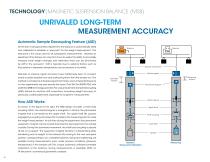
TECHNOLOGY MAGNETIC SUSPENSION BALANCE (MSB) UNRIVALED LONG-TERM MEASUREMENT ACCURACY Automatic Sample Decoupling Feature (ASD) At the start of any gravimetric experiment, the balance is automatically tared and calibrated to establish a “zero-point” for the weight measurement. This zero-point is the value used for all subsequent measurements. However, as experiment time frames can vary from hours to weeks, the ability to accurately measure small weight changes over extended times can be diminished by drift in the zero-point. Drift is typically due to external factors such as Balance...
Open the catalog to page 7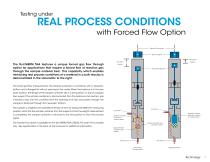
Testing under REAL PROCESS CONDITIONS with Forced Flow Option Balance Connection Electromagnet Measuring The DynTHERM TGA features a unique forced gas flow through option for applications that require a forced flow of reaction gas through the sample material bed. This capability, which enables mimicking real process conditions of a material in a bulk reactor, is demonstrated in the schematic to the right. Zero Point Position Permanent Magnet For forced gas flow measurements, the sample is placed in a container with a “sieve-like” bottom and a flanged lid with an opening in the center. When...
Open the catalog to page 8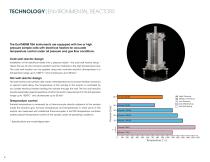
TECHNOLOGY ENVIRONMENTAL REACTORS The DynTHERM TGA instruments are equipped with low or high pressure sample cells with electrical heaters for accurate temperature control under all pressure and gas flow conditions. Cold wall reactor design Installation of the electrical heater into a pressure vessel – the cold wall reactor setup – allows the use of only corrosion-resistant ceramic materials in the high temperature zone. The cold wall heaters can be applied using very corrosive reaction atmospheres in a temperature range up to 1300°C* and at pressures up to 80 bar*. Hot wall reactor design...
Open the catalog to page 9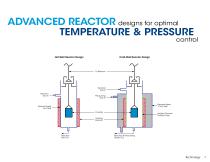
ADVANCED REACTOR designs for optimal TEMPERATURE & PRESSURE Hot-Wall Reactor Design Cold-Wall Reactor Design Pressurizing Gas In Pressure Vessel “Cold” Wall Pressure Vessel “Hot” Wall Crucible Heated Ceramic Partition Tube Heating Element Reaction & Pressurizing Gases Out
Open the catalog to page 10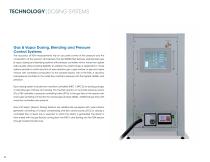
TECHNOLOGY DOSING SYSTEMS Gas & Vapor Dosing, Blending and Pressure Control Systems The accuracy of TGA measurements rely on accurate control of the pressure and the composition of the reaction atmosphere. The DynTHERM TGA features sophisticated gas & vapor dosing and blending systems with pressure controllers which insure the highest data quality while providing flexibility to address the widest range of applications. These systems provide a continuous flow of pure reaction gas, a gas mixture, or gas and vapor mixture with controlled composition to the sample reactor cell of the TGA. A...
Open the catalog to page 11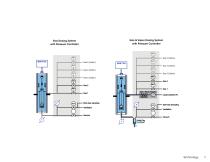
Gas Dosing System with Pressure Controller Gas & Vapor Dosing System with Pressure Controller Gas 5 (Option) Gas 4 (Option) Gas 3 (Option) Gas 2 Gas 1 EGA Gas Sampling Ventilation Vacuum Gas 5 (Option) Gas 4 (Option) Gas 3 (Option) Gas 2 Gas 1 Liquid (ambient P) EGA Gas Sampling Ventilation Vacuum
Open the catalog to page 12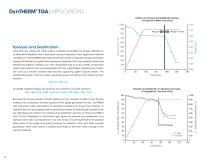
DynTHERM® TGA APPLICATIONS Kinetics of a Pyrolysis and Gasification Process of Charcoal at 900°C and 10 bar Coal, biomass, waste and other organic materials are gasified for energy utilization or as alternative feedstock. Such processes can be measured under application-relevant conditions in the DynTHERM high pressure TGA instruments configured with gas and steam dosing. The first step in a gasification processes is pyrolysis of the raw material, where while heating the organic material in an inert atmosphere (eg. N2 or Ar) volatile components (water, hydrocarbons, tar), are evaporated and...
Open the catalog to page 13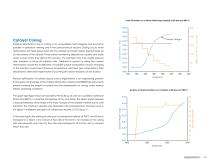
Coke Formation on a Steam Reforming Catalyst at 20 bar and 650˚C Catalyst Coking Catalyst deactivation due to coking is an unavoidable technological and economic problem in petroleum refining and in the petrochemical industry. Coking occurs when hydrocarbon-rich feed gases react with the catalyst, and solid carbon deposits build up on the surface of the catalyst. These carbon-containing deposits can quickly and easily reach a level where they disturb the process. For example, they may create pressure drop problems or block off catalytic sites. Methods to prevent or delay the catalyst...
Open the catalog to page 14All TA Instruments catalogs and technical brochures
-
ElectroForce™ Apex 1
6 Pages
-
DCR_series
16 Pages
-
RSDSC-DSC-ITC
54 Pages
-
HEATING MICROSCOPE - HSML
2 Pages
-
HEATING MICROSCOPE - HSM
2 Pages
-
Broch DHR Accessories
73 Pages
-
Discovery SA
17 Pages
-
Discovery Hybrid Rheometer
23 Pages
-
DMA 3200 - High Force DMA
13 Pages
-
SDT
28 Pages
-
TGA
26 Pages
-
DILATOMETRY
13 Pages
-
ISOTHERMAL CALORIMETRY
34 Pages
-
MICROCALORIMETRY: ITC & DSC
44 Pages
-
TMA
15 Pages
-
VAPOR SORPTION ANALYSIS
8 Pages
-
RUBBER TESTING
19 Pages
-
RSA-G2 SOLIDS ANALYZER
28 Pages
-
DMA
23 Pages
-
Discover DSC SYSTEMS
20 Pages
-
IsoSORP®
13 Pages
-
BROCH-DSDT
28 Pages
-
HIGH PERFORMANCE TGA SYSTEMS
26 Pages
-
ARES-G2 RHEOMETER
36 Pages
-
AIR CHILLER SYSTEM
4 Pages
-
TAM AIR ISOTHERMAL CALORIMETRY
23 Pages
-
MICROCALORIMETRY: TAM IV & 48
48 Pages
-
Nano DSC and DSC Auto
14 Pages
-
ARES-G2 RHEOMETER
16 Pages
-
VTI-SA+
6 Pages
-
Discovery TGA Brochure
19 Pages
-
Discovery DSC Brochure
14 Pages
-
Microcalorimetry
60 Pages
-
Thermal Analysis
68 Pages
Archived catalogs
-
DILATOMETRY PUSH-ROD AND OPTICAL
23 Pages


